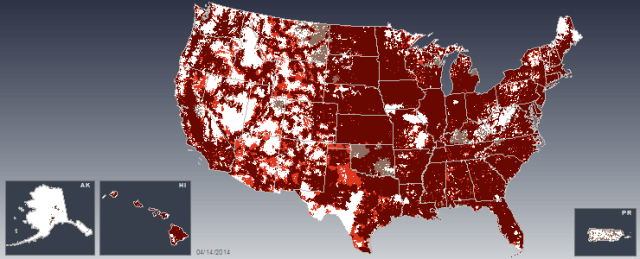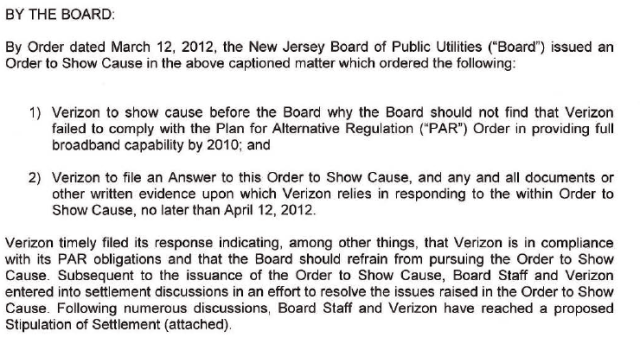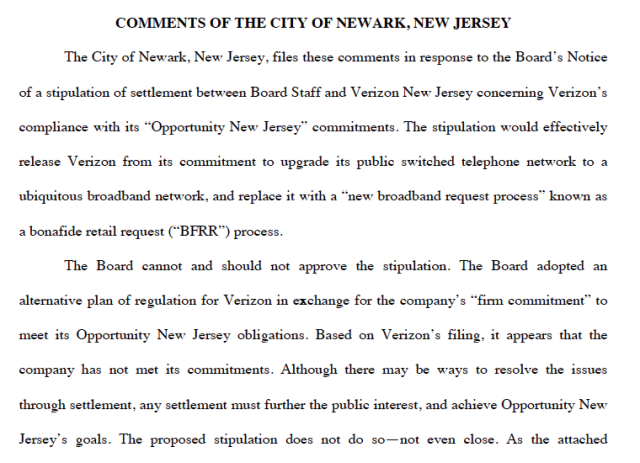Verizon: The other guys did it too
Gierczynski pointed out that the AFL-CIO used similar tactics.
"450 [e-mails opposing Verizon] were standard form letters generated by the AFL-CIO, and of those letters, 25 were from people located outside of New Jersey and some appeared to be from municipalities not in Verizon’s service territory," the Verizon spokesperson said.
Those e-mails said, "Verizon is obligated to upgrade New Jersey’s copper wire network. To fund this expansion, which was supposed to be completed in 2010, Verizon was permitted to collect excess charges from their customers. These charges, which began more than 20 years ago, are still being collected today... I am asking the Board of Public Utilities to be my advocate and not only require Verizon to give me what I was originally promised under Opportunity New Jersey, but to also investigate where my dollars were spent."
As for Verizon's campaign with employees, the company "contacted more than 3,800 management employees who live in New Jersey and asked them to submit comments in support of the stipulation," Verizon said. "Participation was strictly voluntary, and the process was completely transparent. Employees could write their own letters, use the template provided, or modify that template with additional comments. The letters acknowledged the sender’s employment with Verizon and included the employee’s e-mail and home addresses."
What they’re arguing about
The astroturf messages don't really help us understand what Verizon and its opponents claim, so let's take a look at the more substantial arguments.
The state public utilities board's proposed stipulation issued in January would resolve its investigation into what it called "Verizon NJ's alleged failure to comply with Opportunity New Jersey commitments."
The settlement "allows the use of any technology to provide broadband, including 4G-based wireless," the Verizon spokesperson told Ars. "Verizon New Jersey could provide 4G wireless broadband by contracting with Verizon Wireless if that proved to be the best solution for customers."

The stipulation proposes a "new plan of alternative regulation" in which consumers would be handed the burden of having to prove that Verizon should extend them broadband service. To make a request for service, they'd have to gather at least 35 business or residential customers within a single census tract and prove that they "have no access to Broadband from cable service providers... have no access to 4G-based wireless service; and each sign a contract agreeing to at least one year of service and pay a $100 deposit to be credited towards their service."
Within nine months of receiving such a request, Verizon would have to arrange for broadband service to be extended to the customer, but it wouldn't need to be wired broadband. "For the purposes of this Stipulation, Broadband is defined as delivering, through the use of any technology medium (including 4G-based wireless, fiber, copper, or cable), data transmission service at speeds no less than the minimum speed of Verizon NJ's Digital Subscriber Line Services ('DSL') that is provided by Verizon NJ as of today's date."

According to comments filed by the city of Newark, the minimum speed of Verizon's DSL today is just 0.5 to 1Mbps download and 384Kbps upload, well below any typical broadband standard. Newark said defining broadband as including cellular "takes no account of the technology's limitations compared to copper or fiber."
"Current wireless networks cannot now be a complete and perfect substitute for fixed access broadband, except in the least densely populated areas, where there will be few simultaneous users. Wireless service degrades substantially as the number of users increases, and it is subject to significant usage limitations," city officials wrote.
Several other groups have objected, with the New Jersey Association of Counties saying that "approximately 2 percent to 7 percent of the State's residents and businesses in Atlantic, Burlington, Cumberland, Cape May, Hunterdon, Salem, and Warren counties lack access to a fixed broadband network. Under the proposed Stipulation of Settlement, these residents and businesses would be relegated to using less reliable and more expensive technologies for vital education, commerce, and communications needs."

Verizon told Ars that it has "deployed broadband to more than 99 percent of the census blocks across the state" but didn't specify the percentage of residents in each census block who are offered service or say what speeds they are offered. The FCC defines broadband as at least 4Mbps down and 1Mbps up.
The City of Newark says Verizon promised much more. "In the early 1990s, Verizon’s predecessor, New Jersey Bell Telephone Company, requested that the Board subject it to an alternative form of regulation in exchange for the company’s commitment to make New Jersey a 'fully fibered state,'" Newark officials wrote to the state utility board. "The company explained publicly that it pledged to rewire its entire copper telephone network with fiber and emphasized that the plan would impact 'every consumer' because fiber would extend into “every single home and business in the state."
The proposed broadband request process "does not constrain the price that company may charge for such a service offering" and "materially lessens the required build-out, especially in poorer areas," Newark said. The settlement doesn't even impose any requirement to serve public entities, Newark said.
The utility board heard from some small towns. Mayor Ed McKelvey of Aloway Township wrote:
Alloway Township has limited cable service, as only a few areas meet the density requirement of 25 or more dwellings per linear mile. This, coupled with Verizon's failure to upgrade the telephone lines within the Township, leaves many residents with no access to broadband capabilities. This is simply unacceptable.
Verizon first notified the Township of its plans to upgrade to fiber optic in 2005. Despite Verizon's rate increases, nine years later there is still no FiOS and many Alloway Township residents are still without reliable, affordable means of communications services.
McKelvey asked the state to force Verizon to give the township fiber service.
Not all towns are demanding changes to the settlement. Mayor Matthew Henrich of the rural Woodland Township, which has 500 homes, an elementary school, and a "handful" of businesses, wrote that "the proposed settlement appears to be intended to benefit a community like ours."
Verizon: Our investments are “extraordinary”
Verizon has angered customers and regulators from coast to coast by refusing to fix or deploy infrastructure. After Hurricane Sandy wiped out phone lines on Fire Island in New York, Verizon tried to push customers onto wireless service instead of fixing the lines. The company agreed to replace the copper phone lines with fiber only after state officials and the FCC intervened.
In California, Verizon was accused of "deliberately neglecting the repair and maintenance of its copper network with the explicit goal of migrating basic telephone service customers who experience service problems." Verizon has argued that it can't afford to build a fiber network while also maintaining old copper phone lines.
Verizon wrote in support of the proposed stipulation in New Jersey. The state is one of only five where at least 81 percent of the rural population has access to 25Mbps speeds, the company said.
"What makes Verizon’s investments even more extraordinary is that they were made while Verizon was losing billions of dollars in revenue as millions of our customers—in a state that now has one of the most competitive communications markets in the country—'cut the cord' entirely and/or obtained services from VoIP, cable, or wireless competitors," Verizon said. "Despite these challenges, Verizon pressed ahead, not only unwavering in our commitment to meet the goals of Opportunity New Jersey, but, most important, to keep our commitment to our customers to provide the best products, services and networks for their communications needs of today and tomorrow."
Even though not every resident got service, "by any truly informed and reasonable measure, Opportunity New Jersey has been a success, most significantly because Verizon chose to invest billions more in our deployment of broadband than was ever contemplated or required," the company said.
The revision of the 1993 agreement "build[s] on the success of Opportunity New Jersey by agreeing to a proposal to allow any community in Verizon’s territory where groups of customers with no broadband availability may request and obtain broadband service from Verizon."
Verizon called much of the opposition to the new agreement "uninformed and factually inaccurate."
One "false assertion is that Verizon’s broadband obligation could only be met through the deployment of fiber facilities," the company said. "The fact is, as the Board has recognized for years, DSL deployment satisfies the broadband commitments in Opportunity New Jersey. And, of course, FiOS as a broadband service did not exist in 1992, when Opportunity New Jersey was developed. Furthermore, the Verizon Wireless 4G LTE network provides broadband at average data rates that in many cases exceed those provided by DSL."
The 1993 agreement is outdated because "dramatic technological innovations and robust competition in the industry have rapidly spread the availability of broadband services and increased the connection speeds available to consumers and business," Verizon said. Twenty years ago, "Verizon was the sole telephone provider in much of its service territory and no other provider was in a position to provide broadband to residential and single-line business customers."
"In conclusion, we believe the facts are clear and that the Board should approve the Stipulation," Verizon wrote.
However, a state agency responsible for representing the public interest urged the utility board to reject it. The New Jersey Division of Rate Counsel told the board that meeting broadband obligations with wireless instead of wired is unacceptable and that the request process residents have to go through to get service is "insufficient to meet the mandated network deployment and upgrades agreed to by Verizon."
reader comments
133